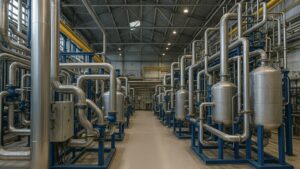As companies strive to achieve net zero emissions, it’s crucial to extend sustainability efforts beyond their immediate operations and into their supply chains. Net zero supply chains play a significant role in reducing greenhouse gas emissions and driving sustainable practices throughout the entire value chain. In this blog post, we will explore strategies for companies to reduce emissions across their supply chains, including assessing partners, collaboration opportunities, and the importance of taking action collectively.
Assessing Supply Chain Partners:
- Mapping the supply chain: Begin by mapping out your supply chain to identify key partners, processes, and emission hotspots. This understanding will help you prioritize areas for improvement and target interventions effectively.
- Supplier sustainability assessments: Assess the sustainability performance of your suppliers by evaluating their environmental practices, emissions reduction initiatives, and adherence to social and ethical standards. Look for suppliers who share your commitment to sustainability and are actively working towards reducing their carbon footprint.
- Collaboration for improvement: Engage in open dialogue with your suppliers to encourage shared sustainability goals. Collaborate on initiatives that drive emission reductions, such as joint projects, knowledge sharing, and technology adoption. Together, you can identify innovative solutions and overcome common challenges.
- Supplier capacity building: Provide support and resources to suppliers to help them improve their sustainability performance. Offer guidance, training, and tools to help them measure, track, and reduce their emissions. This proactive approach strengthens the entire supply chain’s ability to achieve net zero targets.
Supply Chain Collaboration Opportunities:
- Industry-wide initiatives: Join industry associations, working groups or collaborative platforms focused on sustainable supply chain practices. These forums offer opportunities to learn from peers, share best practices, and collectively address industry-specific challenges.
- Supplier engagement programs: Implement structured programs to engage and incentivize suppliers in sustainability efforts. Recognize and reward suppliers that demonstrate exemplary performance and actively contribute to emission reduction goals. Encouraging healthy competition can inspire suppliers to improve their sustainability practices.
- Innovation and technology adoption: Explore innovative solutions and emerging technologies that can drive emissions reductions throughout the supply chain. This can include implementing smart logistics systems, optimizing transportation routes, or utilizing blockchain for traceability and transparency.
Taking Action Collectively:
- Collaboration with customers: Engage customers in your sustainability journey by communicating your net zero commitment and working together to reduce emissions. Collaborative efforts can include joint research and development, product redesign, or supply chain optimization initiatives.
- Advocacy and partnerships: Participate in industry-wide advocacy efforts and collaborate with NGOs, governments, and other stakeholders to create an enabling environment for sustainable supply chains. By collectively advocating for policy changes and supporting sustainable practices, companies can drive systemic change.
- Continuous monitoring and improvement: Regularly monitor and assess the progress of your supply chain sustainability initiatives. Track key performance indicators, set milestones, and adapt strategies based on the insights gained. Embrace a culture of continuous improvement and strive for greater efficiency and emission reductions.
Where to start?
Creating net zero supply chains is essential for companies to achieve their sustainability goals and contribute to global emission reductions. By assessing supply chain partners, fostering collaboration opportunities, and taking collective action, companies can drive significant emissions reductions across the entire value chain. Remember, sustainable supply chains reduce environmental impact and improve resilience, strengthen relationships with partners and customers, and drive innovation.
The “Climate & Legal Risk Summit: Navigating Sustainability in Energy & Mining” summit is a two-day event that brings together leading legal professionals from the energy and extractive industries for a unique opportunity to learn from and network with their peers. It will be held in Amsterdam, NL, on June 5th-6th, 2023. Visit future-bridge.eu and netzero-events.com or follow us on our social media to track other energy use and decarbonization events.





